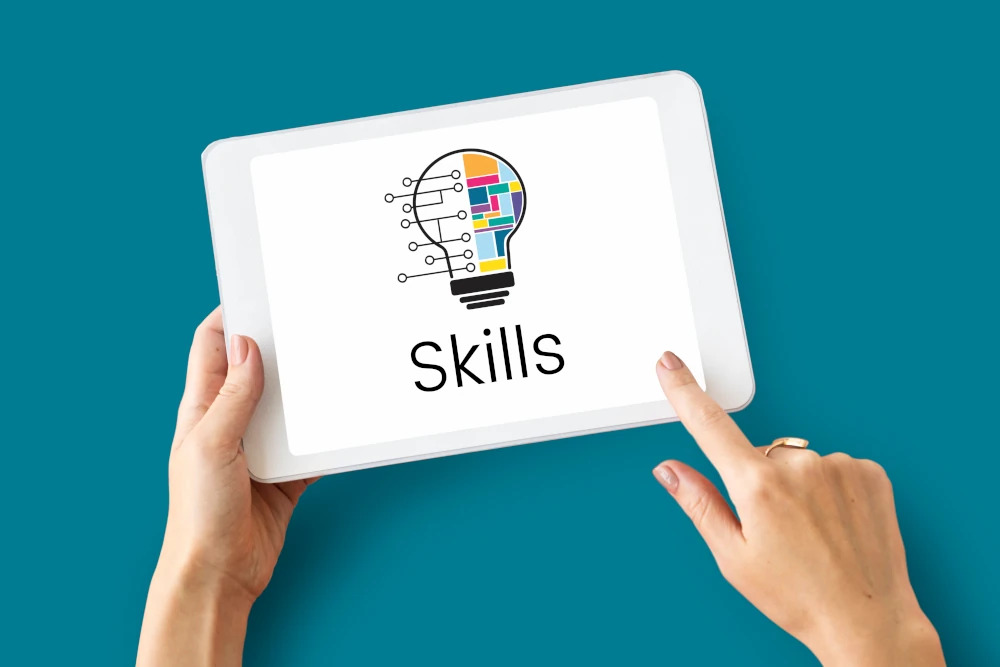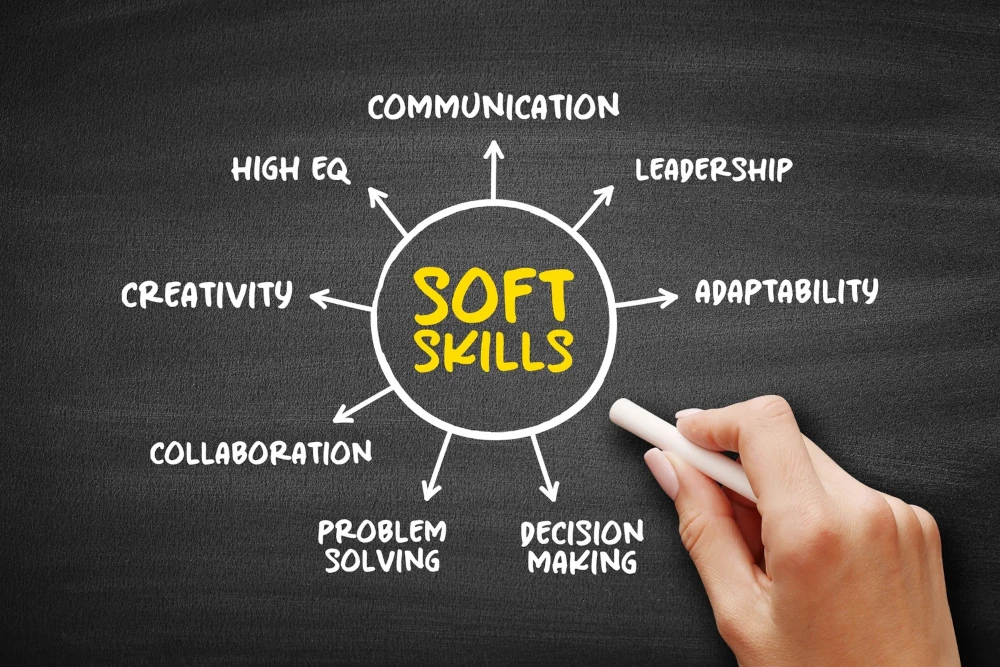Introduction
The metaverse is changing how you interact with digital worlds, and you’re excited about the opportunities it brings. As metaverse developer, you have a chance to shape this new frontier. Our job is to create immersive experiences that blend the real and virtual, including augmented reality.
It’s a field that’s growing fast and needs skilled professionals to push its boundaries.
In this guide, I’ll will show you the steps to become a metaverse developer. I’ll cover the key concepts you need to know. The cross-platform skills that are crucial, and the soft skills that will set you apart. Then, I’ll also explore the different job roles in this field.
Enjoy your reading and please leave a comment!
Grasp Metaverse Concepts

To become a metaverse developer, you need to understand the key concepts that shape this virtual world.
Let’s explore some of the fundamental ideas that make the metaverse unique and exciting.
Decentralization
One of the core principles of the metaverse is decentralization. This means that no single entity has complete control over the virtual world.
Instead, the power is distributed among users, developers, and various stakeholders. Decentralization allows for:
- More freedom and creativity in building virtual spaces
- Increased security through blockchain technology
- User ownership of digital assets
As metaverse developer, you have to grasp how decentralization impacts the way you design and build virtual environments. It opens up new possibilities for user-driven experiences and community-led governance.
Digital Assets
Digital assets are a crucial part of the metaverse economy. These are unique, ownable items that exist within the virtual world. They can include:
- Virtual real estate
- In-game items
- Digital art and collectibles
- Avatars and character customizations
As developers, you need to understand how to create, manage, and integrate digital assets into our metaverse projects.
This often involves working with blockchain technology and non-fungible tokens (NFTs).
Virtual Economies
The metaverse has its own economic systems, often powered by cryptocurrencies and digital tokens. These virtual economies allow users to:
- Buy and sell digital assets
- Earn rewards for participating in activities
- Create and monetize content
To become skilled metaverse developer, you must grasp how these economies work and how to integrate them into our projects. This includes understanding concepts like:
- Virtual currencies and tokens
- Smart contracts for automated transactions
- Play-to-earn models in games
By mastering these concepts, you can create engaging and rewarding experiences for users in the metaverse. As you develop our skills, you’ll be able to build more complex systems that blend the virtual and real-world economies.
Understanding these core concepts is essential for anyone looking to become a metaverse developer. They form the foundation of how the metaverse functions and evolves. As you continue to explore this exciting field, you’ll dive deeper into the technical skills. Afterwards, tools needed to bring these concepts to life in augmented reality and other immersive environments.
Acquire Cross-Platform Skills

To become a successful metaverse developer, you need to master a range of cross-platform skills. These abilities allow us to create immersive experiences that work seamlessly across different devices and operating systems. Let’s explore the key areas you should focus on to build our expertise.
Mobile Development
Mobile devices are often the gateway to the metaverse for many users. To create engaging mobile experiences, you need to learn:
- Swift for iOS development
- Kotlin for Android development
- React Native for cross-platform mobile apps
These languages and frameworks help us build metaverse apps that run smoothly on smartphones and tablets. You should also get familiar with AR technologies for mobile devices, as they’re crucial for blending virtual and real worlds.
Desktop Applications
Desktop computers still play a big role in accessing the metaverse, especially for more complex experiences. To develop for desktop platforms, you should learn:
- C++ for high-performance applications
- C# for Unity-based development
- Java for cross-platform desktop apps
These languages allow us to create powerful metaverse applications that take advantage of desktop computing power.
You should also get comfortable with 3D modelling software like Blender, which is essential for creating virtual environments and objects.
Web Interfaces
Web-based metaverse experiences are becoming more common, thanks to advancements in web technologies. To build these, you need to know:
- HTML, CSS, and JavaScript for front-end development
- Node.js for server-side programming
- WebGL and Three.js for 3D graphics in the browser
Web interfaces allow users to access metaverse experiences without downloading special software. This makes them a great option for reaching a wide audience.
As metaverse developer, you should aim to create applications that work across all these platforms.
This means learning how to use game engines like Unity and Unreal, which support multi-platform development. These tools let us build once and deploy to mobile, desktop, and web with minimal changes.
You also need to understand how to create seamless experiences that transition between devices. For example, a user might start exploring a virtual world on their phone. Then, switch to their desktop for a more immersive session. Your apps should handle this transition smoothly, keeping the user’s progress and assets intact.
To excel in cross-platform development, you should:
- Practice building simple apps for different platforms
- Learn about cloud services for data syncing and storage
- Understand the strengths and limitations of each platform
- Stay updated on new tools and technologies in the field
By mastering these cross-platform skills, you’ll be well-equipped to create metaverse experiences that reach users wherever they are, on whatever device they prefer. This versatility is key to success in the ever-evolving world of metaverse development.
Develop Soft Skills

As metaverse developer, you need more than just technical know-how. Soft skills are just as important for success in this exciting field. Let’s explore some key soft skills that will help us thrive in the world of metaverse development.
Communication
In the metaverse, you often work with diverse teams spread across the globe. Clear communication is vital to ensure everyone is on the same page. You need to:
- Explain complex ideas in simple terms
- Listen actively to team members and users
- Share feedback constructively
Good communication helps us collaborate effectively, especially when working on augmented reality projects that blend the virtual and physical worlds. You should practice expressing our ideas clearly, both in writing and verbally. This skill is crucial when you’re describing new concepts.
Teamwork
The metaverse is too big and complex for any one person to build alone. That’s why teamwork is essential. As metaverse developer, you need to:
- Share ideas and responsibilities
- Respect diverse perspectives
- Adapt to different working styles
Teamwork not only leads to better outcomes but also helps us learn and grow. When you work well with others, you can tackle bigger challenges and create more immersive experiences.
For example, you might collaborate with 3D artists, sound designers, and storytellers to bring a virtual world to life.
To improve our teamwork skills, you can:
- Participate in virtual team-building activities
- Practice active listening in meetings
- Offer help to colleagues when they need it
Problem-Solving
The metaverse is a new frontier, which means you’ll often face unexpected challenges. Strong problem-solving skills help us navigate these hurdles. You should:
- Think critically about issues
- Break down complex problems into smaller parts
- Come up with creative solutions
As metaverse developer, you might encounter technical glitches, design dilemmas, or user experience issues. By approaching these problems with a calm and analytical mindset, you can find innovative solutions.
This skill is especially important when working on cutting-edge augmented reality features that haven’t been tried before.
To sharpen our problem-solving abilities, you can:
- Practice coding challenges regularly
- Analyse case studies of successful metaverse projects
- Brainstorm solutions with team members
By developing these soft skills alongside our technical expertise, you’ll be well-equipped to succeed as metaverse developer. Remember, the metaverse is all about connecting people and creating shared experiences. Our ability to communicate, work in teams, and solve problems will be very important as well.
Explore Job Roles

After learning some skills, you’ll find a variety of exciting job roles that shape this virtual frontier. Let’s look at some key positions that are in high demand and offer great opportunities for aspiring metaverse developer.
VR Developer
Virtual Reality (VR) is at the heart of the metaverse, and VR developers play a crucial role in creating immersive experiences. As VR developer, you:
- Design and build virtual environment
- Develop interactive elements for users to engage with
- Create realistic simulations for various purposes
To excel in this role, you need strong programming skills, especially in languages like C++ and C#. You also need to be familiar with game engines like Unity and Unreal Engine. They are often used to create VR experiences.
VR developers work on a wide range of projects, from gaming and entertainment to education and training. For example, you might create a virtual classroom. Where students can interact with 3D models of complex concepts, making learning more engaging and effective.
Blockchain Engineer
As the metaverse grows, blockchain technology has become an essential part of its infrastructure. Blockchain engineers have a vital role in creating secure and decentralized systems within the metaverse. Our responsibilities include:
- Designing and implementing blockchain networks
- Creating smart contracts for automated transactions
- Ensuring the security and transparency of digital assets
To become blockchain engineers, you need to have a strong understanding of blockchain technology and cryptocurrencies. You should be proficient in languages like Solidity for smart contract development and have experience with blockchain platforms like Ethereum.
In the metaverse, blockchain engineers work on projects like creating virtual economies. Managing digital ownership of assets, and developing secure payment systems. For instance, you might design a system that allows users to buy, sell, and trade virtual real estate using cryptocurrency.
3D Artist
The visual appeal of the metaverse relies heavily on the skills of 3D artists. As 3D artists, you bring virtual worlds to life through our creativity and technical skills. Our main tasks include:
- Creating 3D models of objects, characters, and environments
- Designing textures and materials for virtual assets
- Animating characters and objects for a more dynamic experience
To succeed as 3D artists in the metaverse, you need to be proficient in 3D modelling software. Such as Blender, Maya, or 3ds Max. You also need a good understanding of design principles and a keen eye for detail.
In the metaverse, 3D artists work on a variety of projects. You might design avatars for users, create virtual fashion items, or build entire landscapes for virtual worlds. You work is crucial in making the metaverse a visually stunning and immersive place for users to explore.
As metaverse developer, you might find ourselves specializing in one of these roles or combining skills from multiple areas. The field is constantly evolving, and new job roles are emerging as the technology advances. By staying curious and adaptable, you can take advantage of the exciting opportunities the metaverse has to offer.
Conclusion
The journey to become a metaverse developer is exciting and full of opportunities. As you’ve seen, it involves grasping key concepts like decentralization and digital assets.
But, also honing cross-platform skills for mobile, desktop, and web development. Soft skills such as communication and teamwork are just as crucial to succeed in this field.
The metaverse has a big impact on how you interact with digital space. Whether you’re just starting out or switching careers, there are many roles to explore, from VR development to blockchain engineering. As you continue to shape this new frontier, you’re not just coding. It’s more that that, because you’re creating the future of digital experiences for millions of users worldwide.

Leave a Reply
You must be logged in to post a comment.